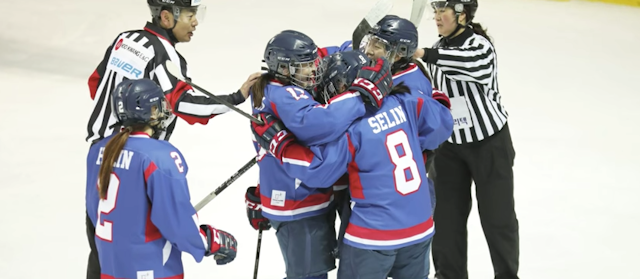The XXIII Olympic Winter Games in PyeongChang provides a fascinating opportunity to consider the complex relationship between sport and national identity, especially as North and South Korea will be fielding a joint women’s ice hockey team.
The last-minute team decision was announced on January 17 as part of the Olympic Korean Peninsula Declaration, and generated considerable debate, especially among younger South Koreans who view the move to be North Korea hitching a ride on the coat-tails of their own team.
In the world of elite sport, the timing of the decision seems like an afterthought, and women’s ice hockey is the only sport where a joint Korean team will feature. So it raises at least two questions. Why the women’s ice hockey team? And is this a genuine act of good faith to promote women, sport and unity, or simply a case of gesture politics that will not be be followed up by any serious diplomacy?
A complicated history
Coexisting in a tense geopolitical atmosphere, these two nation states were manufactured out of the complex arrangements that divided Korea in the aftermath of World War II and the emergent Cold War.
Following the Korean War (1950-53) between the US-backed South and the North, backed by the USSR and the People’s Republic of China (PRC), the uneasy truce suspended but did not resolve the conflict between the neighbours. But despite these divisions, Korean people share a common culture and history that long predates their war.

Against this backdrop, South Korea has transformed itself into a proud sporting powerhouse investing in sport and hosting international events such as the 1988 Seoul Olympics and the 2002 FIFA World Cup (with Japan). Given the kudos that comes with staging the Olympics, it’s not surprising this recent declaration of unity has met with some opposition in South Korea.
Thawing the ‘uneasy truce’
The announcement confirming a delegation from North Korea would take part in the PyeongChang Games has sparked interest in the potential power of sport in international diplomacy and evokes a narrative of unification and reconciliation that aligns – conveniently – with the ideal of the “Olympic truce”.
Teams from North and South will participate in the opening ceremony “together as one Korea”. But beyond these ceremonial rituals, women’s ice hockey is the only sport in which the two Koreas will compete as one, under the unification flag, playing in a specially designed strip, with Korean folk song Arirang – familiar to both nation states – as their national anthem.
But national unity is not something simply created by a flag, a uniform and a shared song. On the surface, the unification arrangements appear positive, but a recent government survey revealed that support for reunification has dropped from 69.3% four years ago to 57.8%. And among South Koreans in their twenties, 71.2% oppose it.
Criticism and protest
It’s interesting that female, rather than male, athletes have been chosen as a symbol of this (temporary) unified “nation”; women are not often elevated in a national narrative, especially in sport. But as promoting women in sport is a key focus for the IOC, it seems reasonable to profile female athletes in this way.
Still, the decision has been the target for legitimate criticism. Hayley Wickenheiser a four-time Olympic ice hockey gold medallist for Canada and an IOC Athletes’ Commission member, is one of many who argue the proposal doesn’t support gender equality in the Olympic movement, as the men’s ice hockey teams have not been combined.
Media reports claim the public believes the female ice hockey players are being treated unfairly and with a lack of respect. It is assumed some players will lose out because of the required inclusion of three North Korean players in each game. An online petition on Blue House – the official website of the South Korean government – protesting the joint team has over 58,000 signatures.
The reasons why women’s ice hockey will be the symbol of “one Korea” beyond the opening ceremony are unclear. The South Korean prime minister, Lee Nak-yeon, didn’t help things when he remarked that the women’s ice hockey team was “out of the medal range” in any case.
It may well be true that neither South nor North Korean teams (world-ranked 22 and 25 respectively) were likely to win a medal. And while the prime minister has apologised for his insensitive and dismissive remark, it suggests a lack of understanding and respect for the female athletes’ hard work, preparation and commitment. In addition to undermining gender equality, the logic seems to undermine two of the IOC’s key values – excellence and respect.
Sport has been used in soft diplomacy between the two nations before – in 1991, at the World Table Tennis Championships in Japan, and at the FIFA World Youth Championship in Portgual. The two states have also paraded together three times at the Olympics. But PyeongChang will be the first time a joint Korean effort enters a competitive team at the Games.
As the XXIII Winter Olympics begin, could the joint team seriously be a starting point for unification after the games? Or will it just be another scheme in which a group of female athletes were played as tokens of international gesture diplomacy?
The answer is probably the latter, at least in the short term. Sport may provide transient opportunities for national unity, but it can’t do the heavy lifting required for political reunification.

